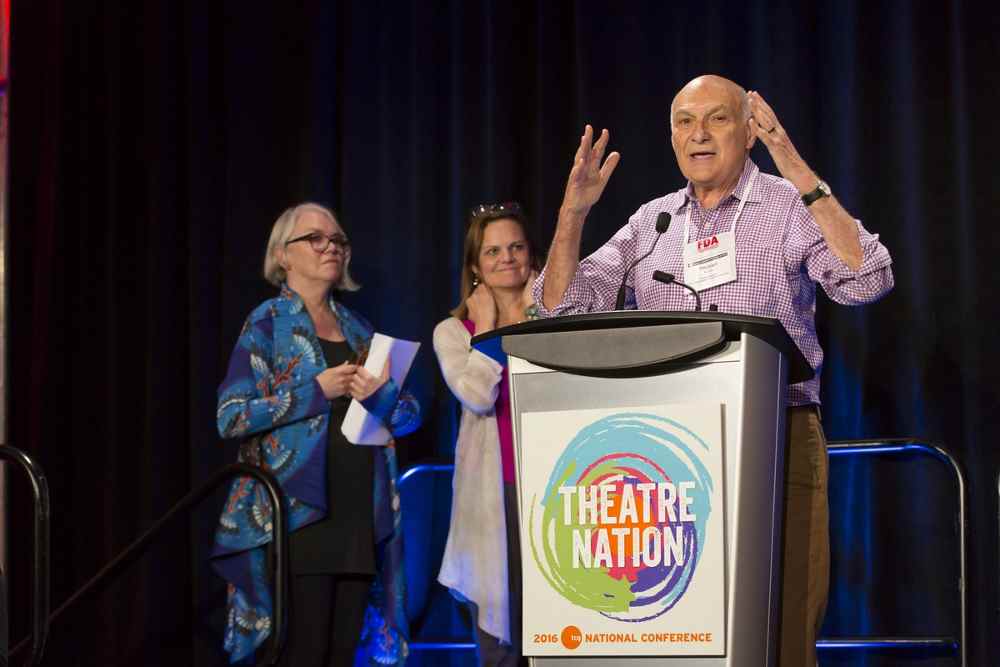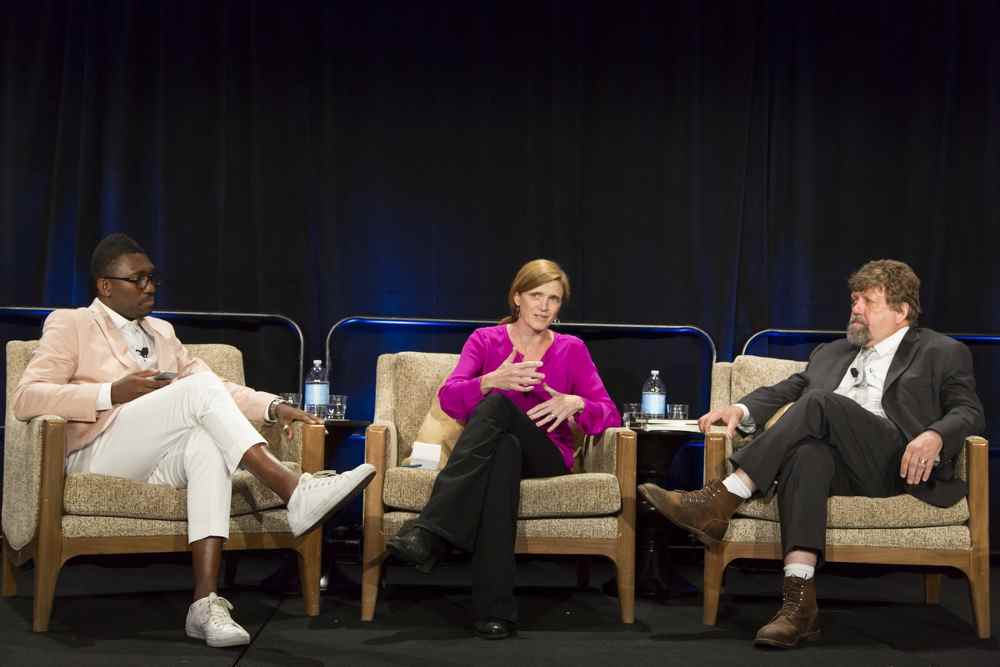WASHINGTON, D.C.: Watching the final plenary of the 2016 National Conference from Theatre Communications Group on Saturday afternoon, I was reminded of a bracing moment in Anaïs Mitchell’s Hadestown, now in production at New York Theatre Workshop. In it, Hades asks the workers in his underworld factory: “Why do we build a wall, my children, my children?” The answer: “We build a wall to keep us free.” Though Mitchell wrote those lyrics back in 2006, they sound like they were written for the summer of Drumpf and Brexit. But as the final plenary of the TCG Conference, titled “Theatre as Cultural Diplomacy,” reminded us: Walls do not make us great or set us free. They limit us—as citizens, as thinkers, as artists. Instead, as Public Theater artistic director Oskar Eustis put it, “Everything that is great or exceptional about this country is because of its embrace of the immigrant and the refugee.”
While previous TCG plenaries centered on building connections—a “Theatre Nation” across America—the final plenary focused on taking that message of artistic solidarity and expanding it globally. For TCG executive director Teresa Eyring, who opened the event, the legacy from this year’s conference is a sense of “increased global connectivity, a sense that as theatremakers we can work toward building our own theatre nation that transcends cultural borders and political borders to create shared spaces for theatremaking and examining global issues we can help solve together.”
A tangible manifestation of that spirit is the Global Theatre Initiative, a collaboration between TCG and the Laboratory for Global Performance and Politics at Georgetown University. The first project of the initiative was a global pre-conference that was held last Wednesday at Georgetown, before the TCG conference proper, where artists and thinkers from 25 countries gathered to discuss not just theatre but also immigration and other transnational concerns.
“The theatre nation I have encountered here is a nation that is not in pursuit of nationalism or any other kind of -isms or schisms, that instead of building walls seeks to foster genuine human exchange, empathy, collaboration, and relationship-building across differences,” said Derek Goldman, a professor at Georgetown and cofounding director of the Lab. “Those who would build walls have always understood the power of silencing artists, of nipping culture in the bud.”
The plenary’s centerpiece conversation brought together Samantha Power, U.S. permanent representative to the United Nations and a member of President Obama’s cabinet, with Eustis and Baltimore Center Stage artistic director Kwame Kwei-Armah.
Haunting the discussion, much as it intruded on the previous day’s plenary, was the recent vote by 51 percent of Britons to leave the European Union. Kwei-Armah, who was born and raised in Britain, opened the discussion by contrasting the Brexit, an “isolationist” policy, with the message of unity at TCG. “It’s wonderful to be at a conference where we are talking about a nation. Can I give a big up to the British contingent, who are as depressed as I am?” He was answered with applause from his distraught compatriots.
The discussion then veered into Power’s track record of using theatre as a means of diplomacy. Crediting her own mother’s passionate theatregoing for her own interest in the stage, Power has taken advantage of her longstanding relationship with Eustis (“I used Oskar as my soft-power projectile,” she quipped) to take U.N. delegations to a number of productions at the Public, including Eclipsed and Hamilton (“I felt the only way I could get one ticket to Hamilton was to invite the whole U.N. Security Council,” she joked). A notable example was the time she took 17 ambassadors to see Fun Home. LGBTQ rights are a “polarizing” issue within the U.N., she said, with 78 member countries where it’s crime to be gay and a dozen where it’s punishable by death. And though she noted some discomfort among them, she also feels there was a thaw. “The thing about any personal story is that life is lived forward,” she said. Watching the show’s young lesbian lead “fighting her own identity or just having a crush and not knowing what to do with it—there’s no human on earth who can’t identify with that.”
She then mentioned a U.N. resolution passed after the recent Orlando massacre condemning homophobic violence—a first for the international body. “I can’t draw a straight line between one and the other,” Power demurred of the connection between Fun Home and the resolution, prompting Eustis to add, “She’s saying that because she’s a diplomat. I will draw that straight line.”
Power also spoke movingly of the impact of first-person narratives as a way to break through boilerplate talking points about world crises, citing cases in which simple, direct testimony has put human faces on urgent needs that couldn’t be captured in charts, including the Ebola virus and Syrian chemical weapons. “My job is to maximize the means of piercing the architecture and artifice and automation that the institution unfortunately projects,” she said.
For his part, Eustis represents an institution founded on openness and access—an ethos that clearly applies not only to his programming but in his advocacy. As talk inevitably turned to the current election cycle, he noted the irony that while a nonprofit like the Public is prevented from supporting a specific candidate, as a coproducer of the commercial megahit Hamilton, he is “unshackled” politically (the Broadway show will hold a Hillary Clinton fundraiser on July 12). And in the midst of a national dialogue he summarized as a conflict between two opposing narratives of America—one “about immigration and openness to the world and…building a nation for everybody,” the other about “trying to recapture a mythical past that never existed, when this was a white country”—Eustis is placing his bets on inclusivity, not only because it promises to change the political order but “is going to change arts funding, change our border policy, change a lot of things….The pressure we bring on those people we elect is to follow their most progressive selves. That is something we can all do as citizens.”

If there is any one thing to take away from a TCG Conference titled Theatre Nation, it is the sense of solidarity—a solidarity that emerges not only from having 1,100 theatre folks spread throughout a D.C. hotel over three-plus days, but from recognizing a shared humanity and the urgent need to preach that message as gospel.
Earlier in the plenary, Michael Kahn, artistic director of Shakespeare Theatre Company in D.C., was presented with the 2016 TCG Theatre Practitioner Award by set and costume designer Susan Hilferty. In his speech, he praised the conference as an inspirational event.
“Tomorrow the real world starts, and it’s a little scary to go back to it, because this was an amazing Brigadoon,” he said. “But I’m going to take everything with me that I learned today.” He then echoed Goldman, saying, “I still believe that the theatre is the place to bring down walls…We can change people’s hearts and we can change people’s minds and we can make our communities a better place.”
Save the date for the next TCG Brigadoon: June 2017 in Portland, Ore.


